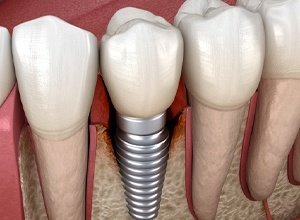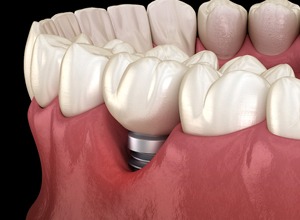Dental Implant Failure & Salvage – Newington, CT
Preserving Your Restored Smile

For the vast majority of patients, their dental implants thrive for year after year and decade after decade. However, there is always the small chance that you will have to deal with a failed dental implant in Newington. On this page, you will learn why dental implants sometimes fail, what symptoms you should be on the lookout for, and how our team may be able to address the problem and preserve your restored teeth.
Why Do Dental Implants Fail?

The most common cause of dental implant failure is an infection known as peri-implantitis. It occurs when bacteria attack the tissue around dental implants in Newington. Eventually, it can become so severe that the implants lose their base of support. Poor oral hygiene is often the reason behind peri-implantitis, but genetics and other factors can also contribute to its development.
Additional reasons why dental implants fail include:
- Failed osseointegration (the implants never bond with the surrounding bone)
- Physical trauma
- Certain medical conditions, such as oral cancer or other problems that interfere with the body’s ability to support dental implants
Symptoms of Failed Dental Implants

There are two broad categories of dental implant failure. Early failure occurs shortly after the implant placement surgery. Late failure can happen years or even decades after you complete your implant treatment.
Here are some symptoms that you should always be on the lookout for:
- Abnormal pain. Some discomfort is normal after implant placement surgery. However, severe pain and pain that occurs after you have had your implants for a while are causes for concern.
- A loose implant. In some cases, a loose-feeling implant is simply a problem with its restoration. In other cases, though, it indicates that the implant itself is failing.
- Signs of infection. Swollen, red, and receding gums are all red flags that merit a trip to see your implant dentist in Newington.
- Difficulty chewing. After you adapt to using your implants, it should be easy for you to consume virtually any food. If you find it challenging to eat tough or chewy items, you should seek professional help.
How Dental Implant Salvage Works

We encourage you to call us as soon as you suspect that something is amiss with your dental implants. The sooner you seek treatment, the more likely it is that we will be able to address the problem without any complex or expensive procedures.
When you arrive for your appointment, we will learn about your symptoms, possibly take some X-Rays, and perform a thorough examination of your mouth. After we determine the cause of the problem, we will be able to recommend your next steps. Sometimes, it is possible to prevent implant failure with the help of antibiotics and adjustments in oral hygiene. In other cases, we must design and place a new restoration. If a problem is particularly serious, we may have to remove a failing dental implant altogether, perform restorative treatments (perhaps including a bone graft), and attempt to insert a new implant later on.
